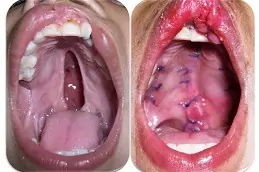Results of Palate Repair Georgia
Palate Repair improves your child’s quality of life, including their ability to breathe, eat, and speak. The gap at the top of the mouth closes, and the muscles and palate lining are rearranged. It improves the lips and palate, and speech impairment is eliminated.
Ideal Candidate
Plastic surgery for congenital clefts of the upper lip is indicated for all children born on time and who have no contraindications for surgery. An ideal candidate for the treatment is someone who does not have the following conditions:
- Associated malformations of vital organs
- Birth trauma
- Acquired diseases
- Physiological jaundice
- Developmental disorders
Preparation
Before your child’s surgery, the plastic surgeon will talk to you about the following:
- The child must undergo a thorough examination by the doctor within seven days before surgery.
- The doctor will take a complete medical history of the patient to ensure no complications arise during surgery.
- The child should not be drinking from a bottle at the time of surgery. They should be able to drink from a cup and eat table foods.
- Follow the diet guidelines provided by the doctor.
Procedure
Surgical treatment should attempt to restore the upper lip’s anatomical integrity, eliminate congenital nasal abnormalities, facial malformations, and create favorable conditions for the growth and correct construction of the middle region of the face in childhood. The Palate Repair Surgery in Georgia, Tbilisi follows the following steps:
- Anesthesia is given to ensure your child’s comfort during surgical procedures. The doctor will recommend the best choice for your child.
- The surgery aims to fix the gap in the lip and restore normal upper lip function, structure, and appearance.
- Incisions are created in the natural folds of skin, muscle, and intraoral tissue on either side of the cleft, sewn together to close the cleft and restore normal lip and nose structure.
- Tissues and muscles are carefully repositioned to close the cleft and rebuild the roof of the mouth, including the soft palate muscles.
- The repositioned tissues are stitched together, providing enough length to allow normal feeding.
- The incision is usually located along the typical lines of the lips and upper nose. They will disappear over time, and your child’s ability to grow and function will continue to improve.
Recovery
After surgery, you can apply bandages to the outside of your child’s mouth. Specific guidance for home care will be communicated to you, which might include:
- Drugs should be taken orally to relieve pain, promote healing, and reduce the risk of infection.
- Unique dietary advice to help protect the surgical site while it heals.
- Restrictions in feeding or activity necessary for routine healing.
- Specific questions for monitoring your child’s overall health.
- Dietary restrictions should be followed.
- In case of discomfort, pain medications should be used.
- After surgery, sunscreen should be applied every day.
Palate Repair Surgery (FAQ’S):
Does Soft Palate Surgery Work?
By signing up for the process, the patients are capable of curing the defect lying within the palate cleft. The patients eventually cure the hurdle of snoring and breathing issues.
Is Palate Surgery Painful?
After the application of anesthesia during the session, the patients are not likely to encounter any kind of painful sensation. However, even after the session, the patients are likely to carry on following the customized cautionary measures in order to defy the eruption of pain.
Can Palate Issues Recur After Surgery?
This phenomenon is still undergoing the research process. Still, according to the researchers, the patients are rarely likely to face the recurrence of the palate after going through the research. To be precise, the chances are low but never zero, so the patient needs to keenly follow the cautionary measures after the session.
How Soon Can I Resume Normal Activities After Palate Repair Surgery?
Even so, the patients are able to receive a customized period of time in order to recover from the session. Still, according to the researchers, the patients are expected to recover within three weeks.
What Is The Success Rate Of Palate Repair Surgery In Georgia?
According to medical researchers, most of the surgical sessions have come across piling up a successful and positive influence by getting along with the customized course of action. Nevertheless, the patients are more likely to keep up with the long-lasting outcome of the process.
When Is The Ideal Time For Soft Palate Repair?
The patient who is just six to twelve months old is categorized as the ideal candidate for the surgical session of the soft palate repair.
What Are The Risks Of Palate Surgery?
The patient is minorly likely to encounter the risks linked with the surgical sessions. Which include bleeding, tissue, or muscular damage, etc. however, the patients are able to get over them by getting along with the customized cautionary measures.
How Do You Fix Palate Pain?
In case of encountering pain within the fixed palate, the patients need to be abruptly taken back for consultation and treatment, in order to cure and correctly diagnose the dermal health hazard, instead of merely relying on home remedies.
How Long is Palate Repair Surgery?
The surgery usually takes two to six hours, depending on the type of cleft palate your child needs. Typically, cleft palate repair uses existing material on the sides of the palatine fissure in the upper mouth and bottom of the nose to restore the palate’s center.
Is Palate Surgery Painful?
After a palate repair, some discomfort is to be expected. Your surgeon and healthcare team will collaborate to provide the best pain management possible, but your child may still feel uneasy. Your child may be given pain medication.
Book an Appointment
Are you looking for Palate Repair Surgery in Georgia, Tbilisi for your child? Contact Sydney Royal Clinic by filling out the consultation form below to book an appointment by having this treatment done with us for the most affordable rates.





